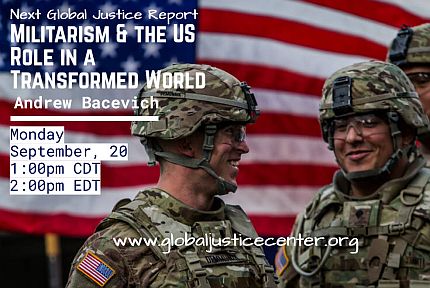Talk: Militarism & the US Role in a Transformed World [] Center for Global Justice
Event Category: Presentations/Discussions
-
Monday, September 20, 20211:00pm CDT – 2:00pm EDT
Andrew Bacevich
As the U.S. completes its military withdrawal from Afghanistan after 20 years, we would do well to remember that our country has not won a war since 1945, even though we have been fighting somewhere or another almost every year since. Except for a couple small excursions, every conflict has ended in stalemate or defeat. This is in spite of having the world’s largest, most modern military machine with an ever expanding budget. Military historian Andrew Bacevich has long been calling for an end to our permanent wars. In his newest book After the Apocalypse: America’s Role in a World Transformed, Bacevich argues Washington’s insistence that a market economy is compatible with the common good, its faith in the idea of the “West” and its “special relationships,” its conviction that global military primacy is the key to a stable and sustainable world order―these have brought endless wars and a succession of moral and material disasters.
Bacevich places current policies in historical context as part of a U.S. tradition going back to the Presidency of Woodrow Wilson, a tradition (of an interventionist, militarized foreign policy) which has strong bi-partisan roots. He says what is urgently needed is a new approach to foreign policy based on moral pragmatism, mutual coexistence, and war as a last resort. Confronting the threats of the future―accelerating climate change, a shift in the international balance of power, and the ascendance of information technology over brute weapons of war―calls for nothing less than a profound overhaul of our understanding of national security.
What we do The Center engages in local community support and outreach to promote and advance initiatives and movements toward social justice, grassroots empowerment and democracy, and environmental sustainability. It is also devoted to critical analysis of the processes and impacts of globalization, both local and international. The Center works to develop alternative socio-economic systems that conserve and share the world’s cultural, economic, and environmental resources for the benefit of humankind.
-
-


